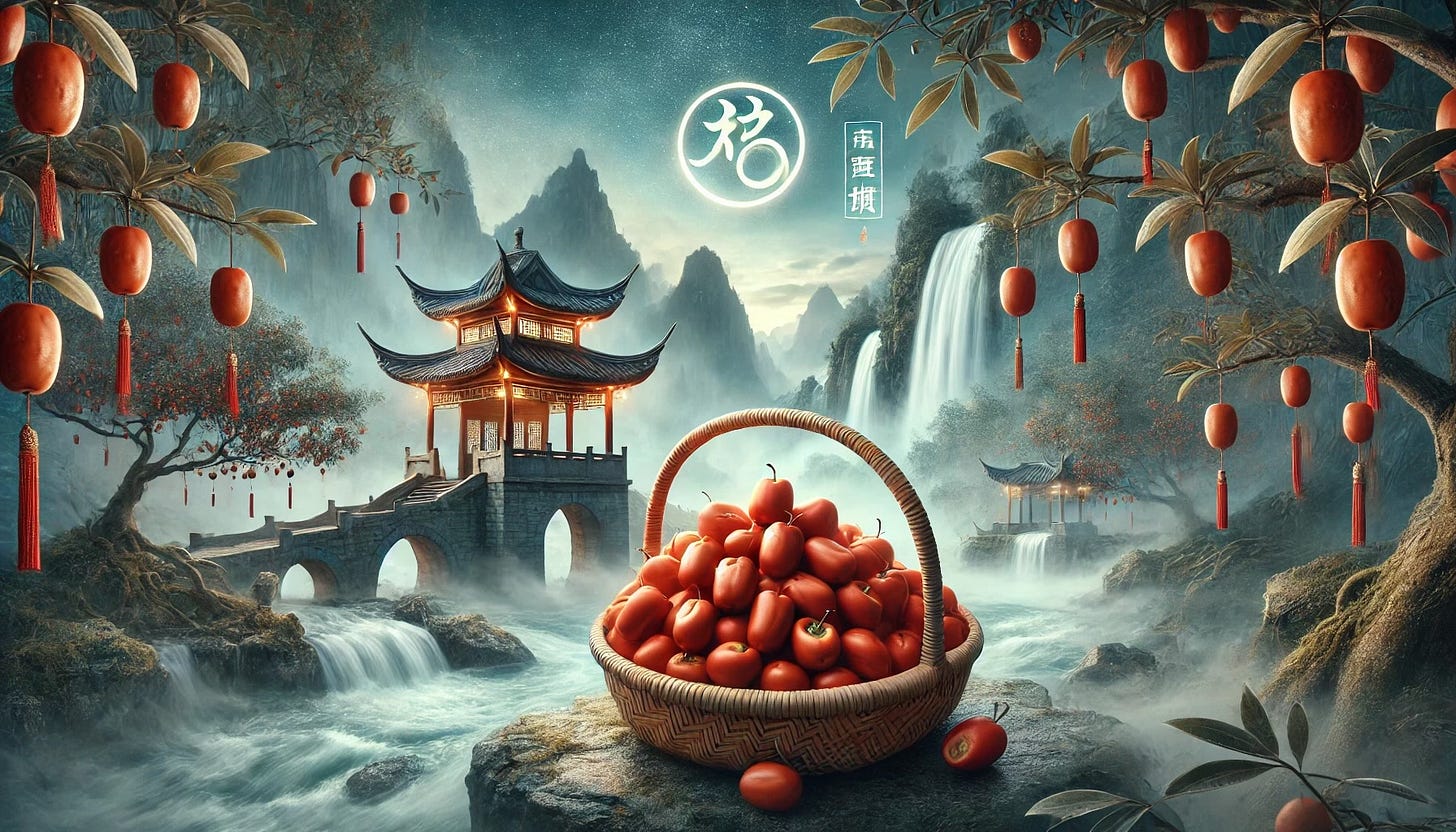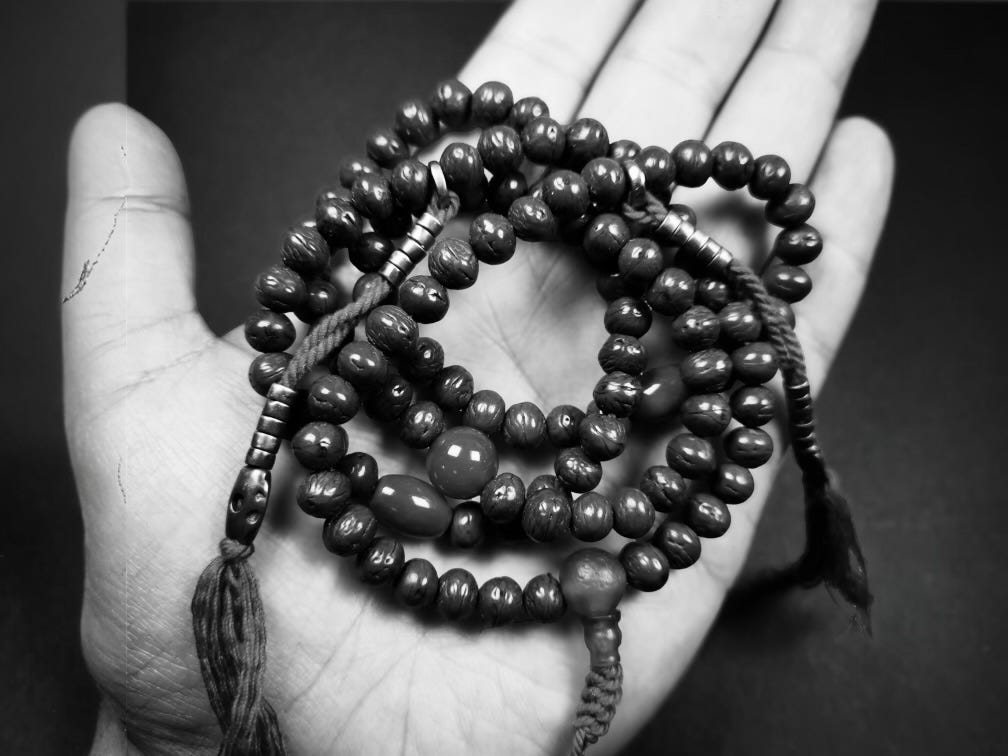Take a moment and imagine a fruit that has not only graced tables for over 7,000 years but has also been at the core of spiritual traditions, healing practices, and cultural rituals.
The jujube—sometimes known as the Chinese date—is no ordinary fruit. It’s a sweet, unassuming little orb with the weight of centuries on its shoulders.
In Taoist philosophy, where simplicity and nature are celebrated, the jujube fruit is a quiet teacher, whispering the secrets of harmony, balance, and living well.
A 7,000-Year-Old Treasure
The Jujube fruit, which I just recently discovered while listening to Taoist author Benebell Wen on YouTube, isn’t a newcomer to the wellness scene; it’s been cultivated and revered in China since the Neolithic era. That’s longer than most modern philosophies have even existed.
In ancient times, jujubes symbolized fertility, abundance, and a sweet, flourishing life. Their blossoms, known for their intoxicating scent, were linked to love and romance, lending themselves to poetry, wedding ceremonies, and the hopes of lovers.
There’s an ancient Chinese saying that if you dream of jujube flowers, love and happiness are on the way. How’s that for some mystical dating advice?
Healing from Within
The magic of jujube doesn’t stop at romantic symbolism. In traditional Chinese medicine, jujubes are said to be more than just a tasty snack—they’re an indispensable component of around 50% of herbal prescriptions. Whether you’re battling fatigue, anxiety, or insomnia, the jujube is your ally.
Their reputed ability to nourish the blood and calm the mind speaks directly to Taoist ideals: to heal the body, you must first nurture the spirit. And this is where the jujube’s dual nature as both food and medicine shines. One bite, and you’re ingesting not just a fruit, but centuries of wisdom encapsulated in sweetness.
Jujube and Taoism: A Symbol of Balance
In Taoism, there’s a reverence for things that are both simple and profound, much like the jujube itself. The fruit’s ability to thrive in harsh conditions symbolizes resilience, while its sweet, energizing flavor speaks to the joy of embracing life’s natural flow.
As a Taoist would see it, the jujube embodies the effortless strength that comes from being rooted in your essence, undeterred by the external chaos of the world.
The fruit is also considered an aid to spiritual practices. Jujube wood is frequently crafted into mala beads used for meditation—a nod to the belief that every part of this fruit holds metaphysical significance.
During meditation, these beads don’t just mark time; they act as conduits, channeling the jujube’s inherent properties of grounding and healing.
Modern Alchemy: From Ancient Remedies to Super Fruit
In our age of superfoods and wellness trends, the jujube remains a hidden gem. With its high concentration of vitamin C, B vitamins, and essential minerals, it’s no wonder it’s lauded for boosting immunity, enhancing blood circulation, and improving overall vitality.
The Taoists might argue, though, that its true power lies in its harmonizing effect—not just on the body, but on the spirit. Modern science is only beginning to catch up to what Eastern philosophy has long known, namely that health is holistic. You can’t just treat the body; you have to treat the mind and soul as well. And that’s precisely what the jujube does.
The Fruit of a Sweet Life
In Chinese culture, if you want to wish someone prosperity, happiness, and an abundant life, you offer them a jujube. This small, crimson fruit is a metaphor for a life well-lived: simple, sweet, and resilient in the face of adversity.
But beyond its symbolism, there’s a deeper truth that resonates with Taoist philosophy. Just as the jujube fruit flourishes with minimal care, often thriving in less-than-ideal soil, so too does the Taoist notion of living in harmony with the natural flow of life, embracing ease over struggle, and finding sweetness in the ordinary.
Your Invitation to Explore the Taoist Way
So here’s a challenge: next time you see a jujube, don’t just pass it by. Pause. Take it in. This humble fruit has journeyed through millennia to land in your hands, carrying with it ancient wisdom and a gentle reminder of what it means to live in harmony. Let its taste, both grounding and sweet, guide you into a small meditation.
Think of it as a bite-sized piece of the Tao—a little bit of nature’s effortless magic, waiting to reveal its secrets if only you slow down enough to savor it. In this world of frenetic energy and constant chasing, the jujube might just be the Taoist teacher you didn’t know you needed.
If this publication has been a source of wisdom for you then please consider helping me sustain it by becoming a monthly or annual contributor.
For just $6.00/month or $60.00/year, you’ll have the opportunity to share your lived experiences with fellow nomads, fueling fiery discussions that provoke, inspire, and challenge you to think differently.
So I hope you will take the plunge today and contribute to my mission of helping human travelers on this life journey.
Onward and Forward
Diamond Michael Scott aka The Chocolate Taoist





Thanks for this. I'm about to try some.